| About Art | Poetry | The Netherlands | |||||||||||||||||||||||||||||||||||||||||||||
BAFA © 2010. All material here is copyrighted. See conditions above. |
Sen McGlinn,
|
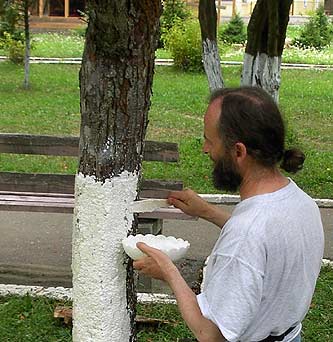 Sen McGlinn, 2002, working on a sculpture at the International Sculpture Symposium in Singeroz-Bai, Romania. Photo: Leidi Haaijer, The Netherlands.
He is applying glue and white rice to a tree trunk in the town park.
Sen McGlinn, 2002, working on a sculpture at the International Sculpture Symposium in Singeroz-Bai, Romania. Photo: Leidi Haaijer, The Netherlands.
He is applying glue and white rice to a tree trunk in the town park.
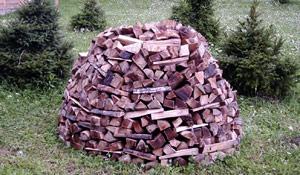
A Home for Small Animals, 2002 an igloo-form made out of stacked firewood, with no entrance, in the Singeroz-Bai, city park. I like the art of poetic suggestion, of the found object, and of the minimum intervention that helps the viewer to read ‘with the grain’ of the found. The sculptors were presented with wood, and with a park: I decided to take both as the found. 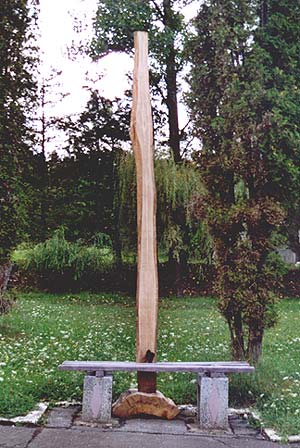
'Standing Stone', 2002 in the Sintgeorz-Bai town park. Ait Burn and Worm's Turn Ait burn and worm's turn flames my discontent. Land of nothing, unprimed canvas, mere lumps in the ocean end. (time passes) Unfenced, unchangeable and unkind clears (it surely passes) ache for the plough for trees unplanted. Hard home, I can't look back in anger or affection: You've got nothing going for you cat! I'll be back. |
The Glove
I The glove discovered on the stair after a last farewell must be wrapped and posted after. Clothes she wore, lying jumbled in the room of the deceased must be picked and placed away though the breath stumbles. Times of the heart-skein flayed bare as ´the anatomy of a horse´, tissues shrinking from the touch of air. After this, mainly silence: Saint John writes to us out of the night. Then, the pressed-down question-rod, prayer, touches a buried main. Here-am-I lightenings illuminate the circulation of the blood. A bud in the dull brain flares: ´loving is a little death´. The laid sod crumbles, the desiccated slain touch rain, and prophecy a storm. From naked to knowing nothing will be the same. II The dead Dead Sea´s too salty to decay: the unbearable sun had dried the clay and clogged the Jordan's veins until the storm cloud breaks upon a hill, somewhere near Jerusalem. Once, in a siege, a way was dug down through the living rock to water, and then forgot. Black Friday's sudden flood finds this way. A finger-to-finger lightening vaults, a touch, a flash, a flood and the ocean and Jordan are joined. The river Jordan is joined to the Most Great Ocean, and the Son, in the holy vale,
crieth out: ´Here am I, here am I, |
Cords From Karore to Ranga-ika the cliffs are twined with the frayed cords of waterfalls, snapped halfway to the sea. We spend half our lives herding wool on the hills, but when the waves heave mucky-grey and the night winds salts the island, bending iron roofs as the lights flicker out, we know the cords have reached the sea and we are tied as ever. On such nights the island is torn from its moorings, dragged a few hundred miles further from the uncomfortable presence of land and the lighted cities that dwell there.
The Holiness of Doubt I abjure you, Parthenon, I abjure, Venus, I eschew all singlemindedness, except, The bleak courage of those who have no choice. No more the crisp Granny Smith Its flesh of ice, its certain skin, Billy Apple, I smuggle you leaf-curler, An embrace of bruise and blemish. I praise the amputee's iambic doubting gait, Faulted, fractured, and unsure of grace, Every step a questioning Of gravity's faithfulness. Send to surgery the gangrened mastery, All smooth gliding and untruthfulness. Admit the ambush botched But pursue the well-pursed poem doggedly, Like a one-legged footpad. The victim will stop along the road, sure, The tortoise hunts the hare. Kick those pearls into a corner And pull up a sea-urchin. I want you to feel at home. > Detail of the sculpture, History of Civilization, at the DRAP Recycle Art Event, Museum of Contemporary Art, Barcelona, Spain, 1997. |
Bonjour, Monsieur Courbet
Like Courbet, with his pack of trade, I came As proud to paint myself, vagrant on the land And, gypsy in the whistling wood, I found no lady, but a land Through which no travellers passed And wanted none within its brined bounds to tune Nor any aid to celebrate the storm For though the poet struts and thrusts his chin Halfway to heaven, and wills the storm his pride What came without his aid will rage without, The island elements demand a poll-tax, the empty head is returned. And if I sing the jewelled isle, Splendid on a splendid day, With Mangere's stone blue misting away, I'll sing from a safe distance. And the lonely girls, That needed but a love to live, Maud, or Rose, or Venice, That rang in a vagrant's heart like a gift of bells Are not here, and the gypsy is dry And dying in my shell. The panzers, when they came The panzers, when they came, destroyed first love's flamboyant cavalry like summer's mustard, scythed and thrown. My private patriotism (Which is, our need for one-another) learns the pass-words of endurance. The silk oxen stand waiting For the golden yoke. When solitude hurts my head the tide runs not red but dark as the sleeping hill patterned with street-lamps and stars. When solitude hurts my head the traffic does not slow but busy in the head-lit night, ashore the party-goers go. When solitude hurts my head the moon is no more thin, or pale, for that but intersects the destined cloud impassively. When solitude hurts my head I stand in the hatch and watch the black tide sink the bay. Moon and stars and clouds and cars. When solitude hurts my head I pray in the warm, lanterned, cabin, while far far away, on shore The cold electric street-lamps stand. Ship-wreck (For Peter Smart) The lee coast sidles closer:crab for sea-room, lose by inches. Calculate the squall's spume-talloned paws and measure off the rocks that punch their tops craggèd, in the waves' interstices. The sound of the wind shines through the hull as if it were glass; the cabin is thundered in surf, and this familiar little tub is whole alive, felt every plank, in the anxious eye. So, those most intimate of vessels wherein the blood is said to course: unregarded, 'till the night alone when it hums and leaps in ribs and ears and drags towards the instant of rupture; the life-blood's artery, pierced and splintered, a wave to stun a bull, and tumbling foam. Peter Smart was the editor of Caxton Press, a major publisher of New Zealand poetry and prose.
Adapted from the 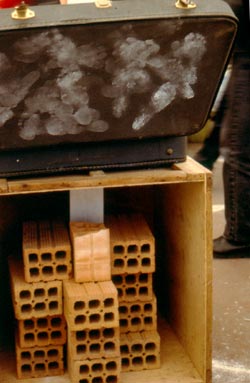 |
Roger White's Notes Postmarked The Mountain of God
Of course this is also the narrative of a particular pilgrimmage: the character of the pilgrim is piece by piece revealed in and between the lines, and the particularities of the places, orange blossom and heat, taxis and tourists and the pilgrim-house, are there. But the sequences seem to be a deliberately adopted form in which his meditations can be evolved. The mountain of God and the daily insistences of Israel provide a landscape of symbols for ideal and everyday realities. The pilgrim begins with a certain picture of a 'spiritual' pilgrimmage, which is at first confirmed: the postcards of Haifa did not lie. But he finds that he himself is an incongruous piece in this picture: He hears a fellow pilgrim weep and longs to have his own heart break or conflagrate that he might rush forward, ashes dribbling from his cupped hands, to scatter them upon the threshold. A scornful voice in his heard cause him to squirm...
| ...In the past the arts have often been viewed with some suspicion by religions and by 'religious people'. At various times the visual arts, music, and dance have all been forbidden on religious grounds. In the Bahá´í Writings the arts are praised, and these former prohibitions are annulled:
| 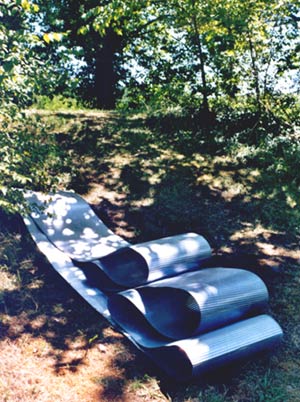 Water Sculpture, 2001, by Sen McGlinn, at Performances Conditionelles, organized by Christophe Doucet, Taller, France.
Water Sculpture, 2001, by Sen McGlinn, at Performances Conditionelles, organized by Christophe Doucet, Taller, France.
soul may leap for joy and humble itslef in prayer to the realm of Glory." 'Abdu'l-Bahá, Selections from the Writings of 'Abdu'l-Bahá, p. 112.
|
We have permitted you to listen to music and singing. Beware lest such listening cause you to transgress the bounds of decency and dignity. Rejoice in the jou of My Most Great Name though which the hearts are enchanted and the minds of the well-favoured are attracted.
We have made music a ladder by which souls may ascend to the realm on high. Change it not into wings for self and passion. Bahá'u'lláh, Kitáb-i-Aqdas p.31 Such a chaste and holy life... involves no less than the exercise of moderation in all that pertains to dress, language, amusements, and all artistic and literary avocations... it condemns the prostitution of art and literature... It can tolerate no compromise with the theories, the standards, the habits, and the excesses of a decadent age. Shoghi Effendi, The Advent of Divine Justice, p. 30.
Every word that proceedeth out of the mouth of God is endowed with such potency as can instill new life into every human frame, if ye be of them that comprehend this truth. All the wondrous works ye behold in this world have been manifested through the operation of His supreme and most exalted Will. His wondrous and inflexible Purpose. Through the mere revelation of the word "Fashioner," issuing forth from His lips and proclaiming His attribute to mankind, such power is released as can generate, through successive ages, all the manifold arts which the hands of man can produce...
No sooner is this resplendent word uttered, than its animating energies, stirring within all created things, give birth to the means and instruments whereby such arts can be produced and perfected. All the wondrous achievements ye now witness are the direct consequences of the Revelation of this Name. Bahá'u'lláh, Gleanings from the Writings of Bahá'u'lláh, p. 141-2.
By the power of the Holy Spirit, working through his soul, man is able to perceive the Divine reality of things. All great works of art and science are witnesses to this power of the Spirit. 'Abdu'l-Bahá, Paris Talks, p. 85
Arts Dialogue, Dintel 20, NL 7333 MC, Apeldoorn, The Netherlands email: bafa@bahai-library.com | |||||||||||||||||||||||||||||||||||||||||||||||||